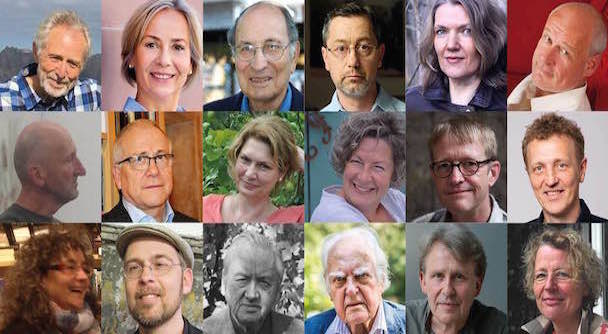Authors & Books
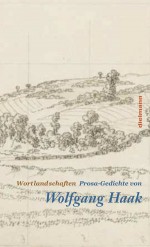
978-3-86638-386-9

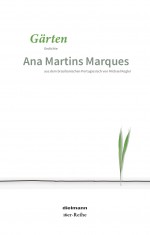
Gardens (Gärten)
Poems
- Series 16er
- hand stitched
- 44 pages
- German translation by Michael Kegler
978-3-86638-311-1

Ana Martins Marques is a star of the poetry scene in Brazil, and Michael Kegler has carefully transcribed from her slim volume »A Garden for Ingeborg« and included some more of his favorite poems by her:
To her own seven favorite women lyricists, in turn, Ana Martins Marques prepares a garden of her own in one poem each in our selection. These are the poets
Orides is Orides Fontela (1940, São João da Boa Vista – 1998, Campos do Jordão);
Sylvia Plath (1932, Boston - 1963, London);
Wisława Szymborska (1923, Kórnik – 2012, Kraków);
Alejandra Pizarnik (1936, Avellaneda – 1972, Buenos Aires);
Marina Tsvetaeva (1892, Moscow – 1941, Yelabuga);
Ingeborg Bachmann (1926, Klagenfurt – 1973, Rome);
Laura is Laura Riding (1901, Nova Iorque – 1991, Sebastian, Florida).
Poems by Ana Martins Marques have been translated into Spanish, Italian and German. Her fourth volume of poetry, »Risque esta palavra« (2021), was recently published in Brazil, and its title – in German: »Cross out this Word« – may well be read programmatically.
Translated with www.DeepL.com/Translator (free version)
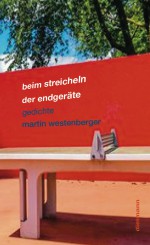
978-3-86638-385-2

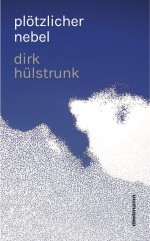
978-3-86638-383-8

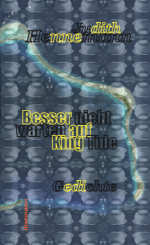
Better not wait on King Tide
Poems
- Softcover
- 88 pages
- one map with ship positions
- one island border
978-3-86638-384-5

»Better not wait on King Tide« poetically processes reports on the nuclear weapons tests conducted by the USA on the Marshall Islands in the Pacific Ocean between 1946 and 1958. Against the backdrop of rising sea levels and the associated danger both for the island chain itself and its inhabitants and for the already fragile »Runit Dome« in which the radioactive »final« waste from the tests was collected, this extreme example raises the question of the systemic effects of our treatment of the biosphere.
Located far from our continent, the island chain demonstrates the devastating effects of nuclear technology, which has just been declared sustainable in the EU taxonomy, even without its use in the form of weapons. The »Runit Dome« embodies a prognosis for the search for the nuclear repository in Germany and Europe as a whole.
How slowly ten days can pass by, how quickly
these miles sum up. Will you allow me to rest
my hand on your thigh, if I drive temperately?
You left me and all these cookies in appropriate
spots: Car keys and toothbrush, pieces of white
and black laundry, curled up in a drum. Orbiting
one another. No shut-eye for the machines since
you’re gone. They remain in place. Whispering
your incantations to complicated little things.
Pulling me closer.
How does poetry and how do we deal with irreversibility in our language? – These poems are not playing with some acrobatic llinguistic possibilities – here, poetry is virtually called upon to work on our language. Judith Hennemann does that.
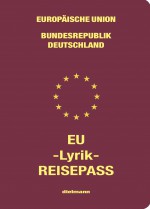
EU Poetry Passport
- 64 pages
- softcover of our EU passport
- in the tried and tested
- format 91 mm by 125 mm
978-3-86638-400-2

Imagine a small booklet in the format of our passport—that official Bordeaux-red pseudo-linen-covered thing with all the visas and stamps of our travels. Now, however, not with the pages for all the entry and exit stamps as content, but 27 sheets, the double pages of which are each populated with one or two poems on the theme: »Border, Passport, Visa, Foreigner, Nation, Neighbour, Neighbouring Country«.
What's more, the poems each come from one of the 27 EU countries, all of which are thus poetically removed from their borders—in short, a poetry passport across the whole of Europe (i.e. the officialised current Europe of the EU).
The passport is the noblest part / of a human being.
So wrote Bertold Brecht, still enthusiastic about the great invention of a document that identifies people as members of states, but precisely because of this guarantees the inviolability of free movement and personality—because this passport is sovereign property, therefore cannot be arbitrarily confiscated in a foreign country and its bearer cannot be arbitrarily detained.
The stamps in our document have been, shall we say, simulated. They do not express any sovereignty or state pomp; they simply list the poets who have written about the border and the journey, indicate their year and place of birth—HERE you’ll see; and that is all we need for our journey.—Wait, maybe this:
Attached to the stamps is another home of this project: the European Book Projects. This is an EU-wide project by axel dielmann – verlag and Frankfurt Academic Press and 34 other partners across Europe. At the heart of the project is the observation from almost 30 years of publishing work that a high percentage of book projects already have the potential to be published in some or several, sometimes even all, EU countries in the early stages of their development—in other words, European Book Projects. The EU Poetry Passport is one such European Book Project that I would like to see realised in all EU countries.—More soon at www.europeanbookprojects.eu.
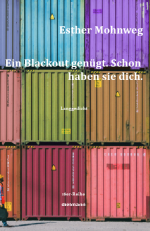
One blackout is enough. Already / they have you
Long-Poem
- Series 16er
- hand bound
- 48 pages
978-3-86638-368-5

A long poem. Well. Read it – that's how it starts:
HOLM has them all
in his head. It's a matter
keeping the slogans of the day
at bay. The
already extremely deformed body of Holm
is to remain in the immediate
arising out of itself,
blossom again aside. A
deviation from the almost
process of maturation,
blind singing,
stumbling in the forest,
the anachronisms checked off, no more
sacred feeling any more, Holm
wants to make himself without pretension
literally in the company
of those gathered by him.
The hiding place is well chosen.
It is the years
and a blue leather armchair
in the vanishing point.
At granted times, regularly,
Holm picks up the thread,
totally unbound
to express himself.
One lets him, because
one lets old people.
Virtue reigns here. Holm
thinks nothing of it, his
senses search undiminished
the opposite, the illicit
oscillating. The
vice. Giggling, Holm draws
a penis with wings
under his last line.
From the ceiling,
radiated fourfold,
a D minor chord calls
to dinner.
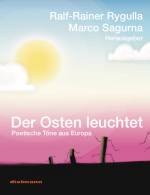
Der Osten leuchtet (The East Shines)
Poems from East- and Southeast-Europe
- Hardcover
- with ribbon
- 400 pages
- one of our 8 titles
- poetry in 2022
978-3-86638-306-7

Poems from Eastern and Southeastern Europe have been collected by Ralf-Rainer Rygulla and Marco Sagurna—this is poetry from a total of 92 poets from 20 countries:
Belarus, Bosnia and Herzegovina, Bulgaria, Georgia, Croatia, Latvia, Poland, Romania, Russia, Serbia, Slovakia, Slovenia, Czech Republic, Turkey, Ukraine, Hungary and Cyprus.
And they are throughout very different poetic voices from those we currently know as the »canon« of German-language poetry. »The appreciation for Eastern Europe in Germany is more than capable of extension; the relationship to these countries even more. Poetry can help. Many local poets translate and re-poetize it excellently, this East. Much of the admirable poetry made in Germany, however, can hardly run for aesthetics and depth. I feel real power in the poetry of the East. These are texts that are needed, not nice-to-haves,« says Marco Sagurna.
»For our collection, we looked through more than 174 books and about 58 manuscripts. We talked on the phone, emailed, videoconferenced, and went into retreats again and again in Frankfurt am Main and Hanover. We copied every single shortlisted text, read them to each other, and selected only those that we both considered indispensable,« say the editors, »the book is a message.«
Poetic texts are collected here, adapted by renowned authors and translators: from Amanda Aizpuriete, Tomica Bajsić, Justyna Bargielska, Boris Bartfeld, Artur Becker, Olessja Bessmeltseva, Ivan Blatný, Aleksej Bobrovnikov, Ivana Bodrožić Simić, Petr Borkovec, Metin Cengiz, Bela Chekurishvili, Danila Dawydow, Jacek Dehnel, Kornélia Deres, Jan Faktor, Jelena Fanajlowa, Richárd Fekete, Senem Gökel, Anja Golob, Georgi Gospodinov, Mariusz Grzebalski, Michal Habaj, Klára Hůrková, Nikolai Jakimtschuk, Alexander Kabanow, Claudiu Komartin, Andrzej Kopacki, Dagmara Kraus, Dmitri Kusmin, Liāna Langa, Jegor Letow, Ewa Lipska, Zvonko Maković, Milena Marković, Micho Mossulischwili, Márió Z. Nemes, Ruxandra Niculescu, Jovan Nikolić, Erik Ondrejička, Gonka Özmen, Sándor Attila Pál, Miodrag Pavlović, Marko Pogačar, Traian Pop Traian, Zsuzsa Rakovszky, Ilma Rakusa, Boris Ryzhy, Tomaž Šalamun, Horst Samson, Maia Sarishvili, Gleb Schulpjakow, Faruk Šehić, Waleri Samskich, Andrei Sen-Senkow, Irma Shiolashvili, Dmitri Strozew, Sergej Tenjatnikow, Anna Terék, Eugeniusz Tkaczyszyn-Dycki, Ottó Tolnai, Alexander Ulanow, Ádám Vajna, Kārlis Vērdiņš, István Vörös, Dmitrij Vodennikov and Izzet Yasar.
The texts were translated into German and re-penned by Georg Aescht, Arnfrid Astel, Alida Bremer, Urŝka P. Černe, Nevfel Cumart, Doreen Daume, Kurt Drawert, Özlem Özgül Dündar, Jan Faktor, Claudia Gabler, Zsuzsanna Gahse, Sylvia Geist, Matthias Göritz, Margita Gūtmane, Manfred Peter Hein, Robert Hodel, Peter Holland, Petruscha Huber, Norbert Hummelt, Brigitte Oleschinski, Valeria Jäger, Orsolya Kalász, Uwe Kolbe, Sabine Küchler, Monika Rinck, Christha Rothmeier, Joachim Sartorius, Sabine Schiffner, Annette Simon, Alexander Sitzmann, Christian Steinbacher, Sergej Tenjatnikow, Hans Thill, Peter Urban, Achim Wagner, Andreas Weihe, Ron Winkler, Uljana Wolf, Eva Zador and Franciska Zwerg.
Find the entire List of Content as download.
Many thanks to Andrée Sandkötter for designing the cover.






